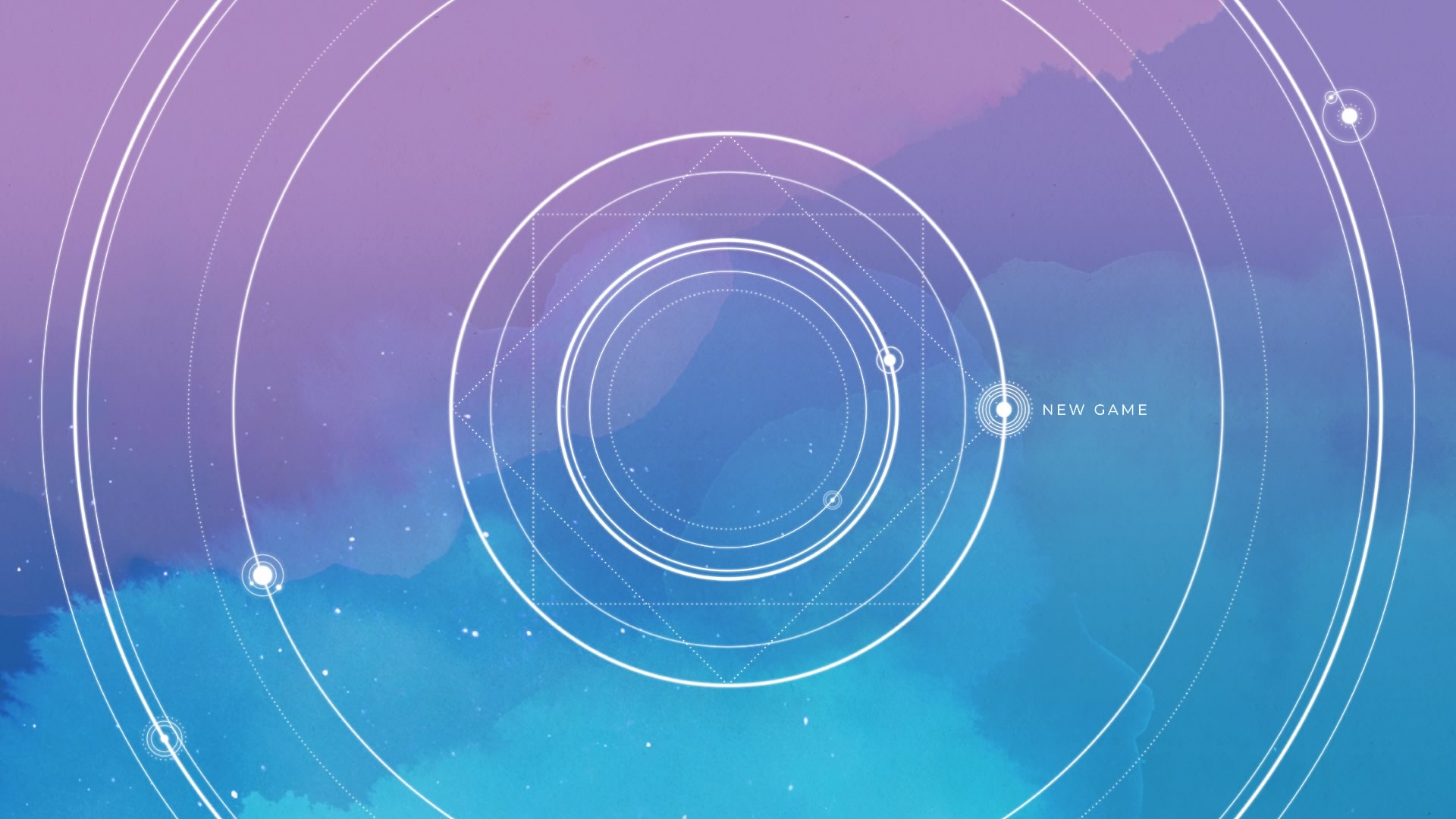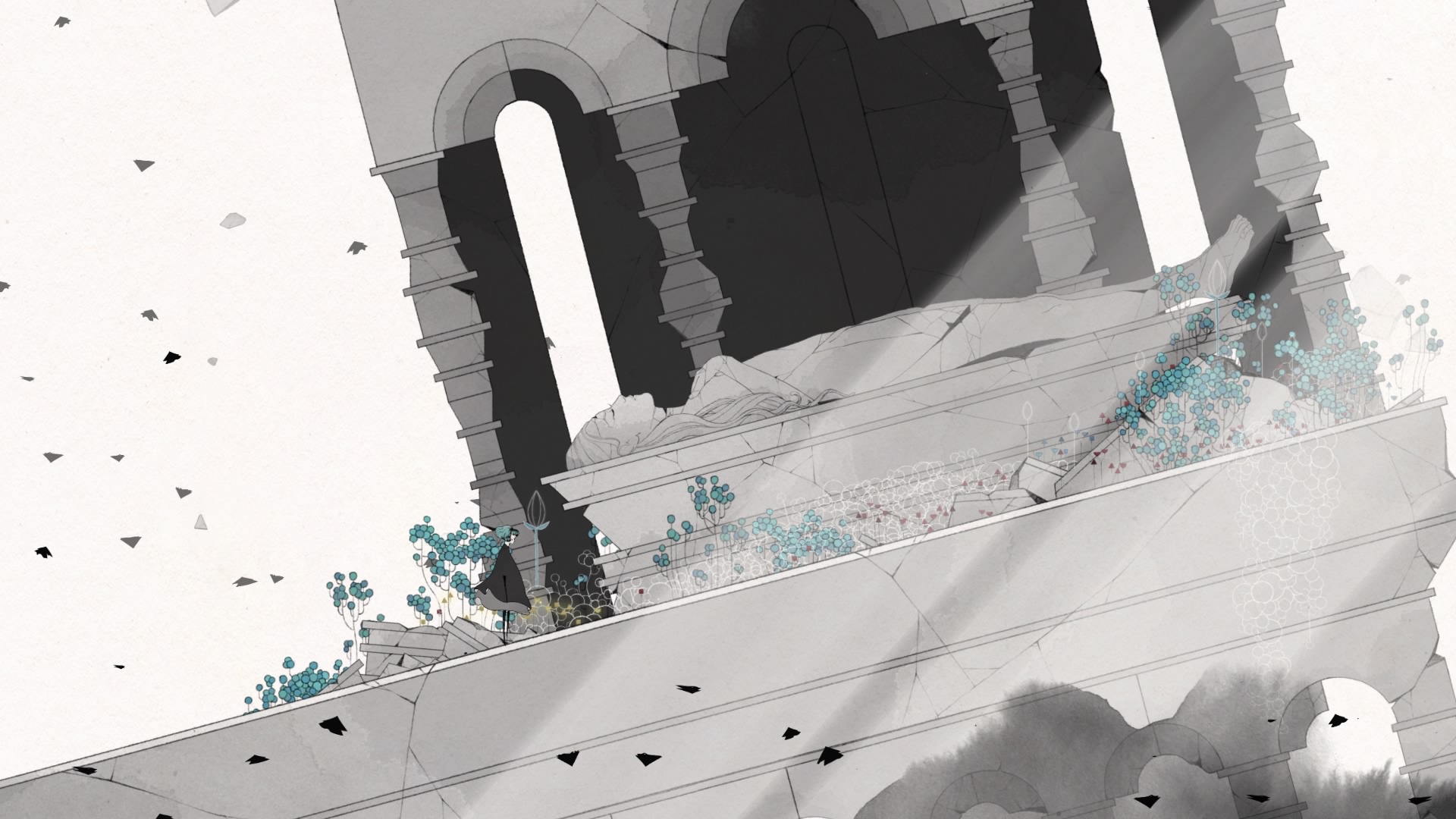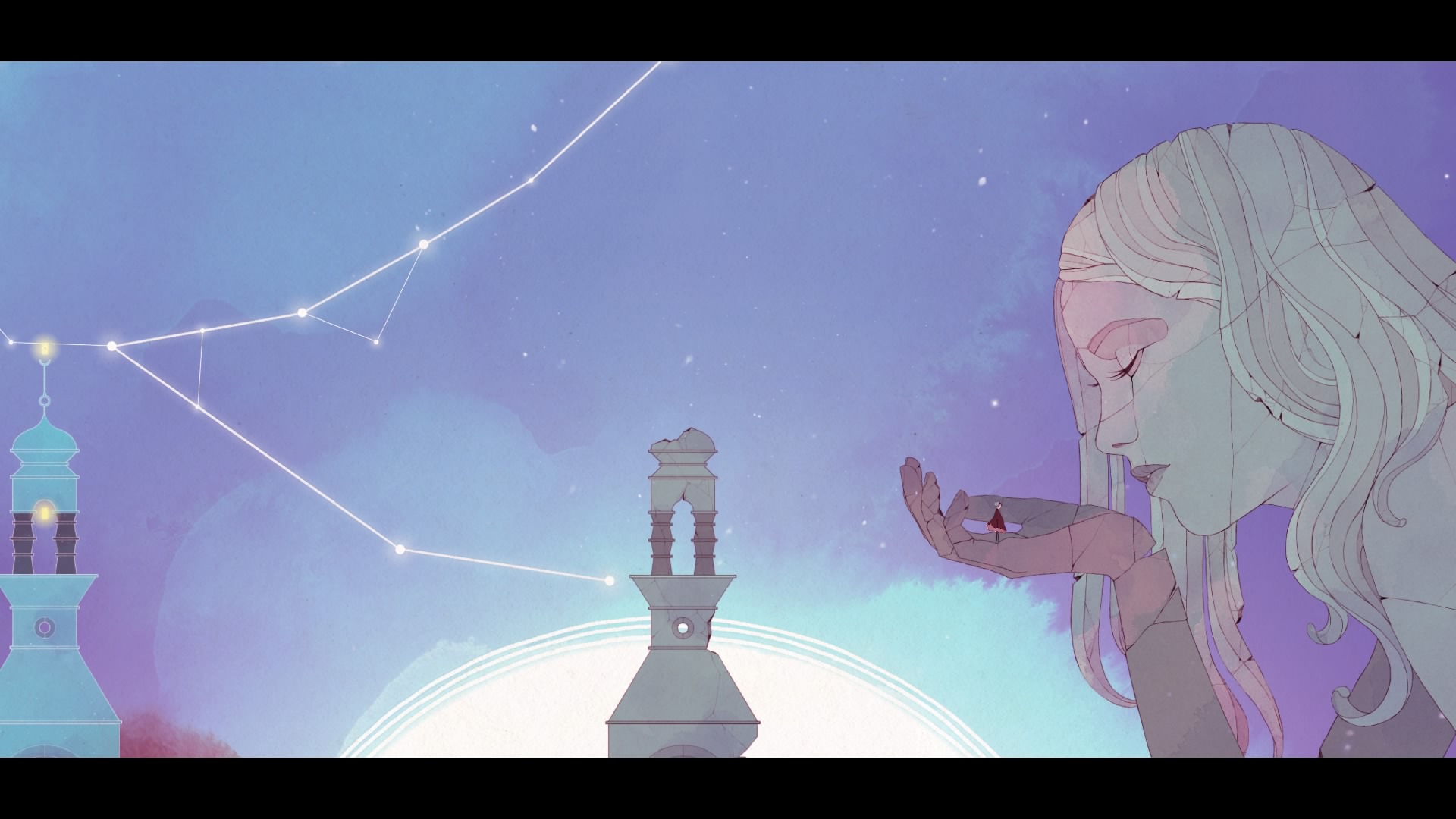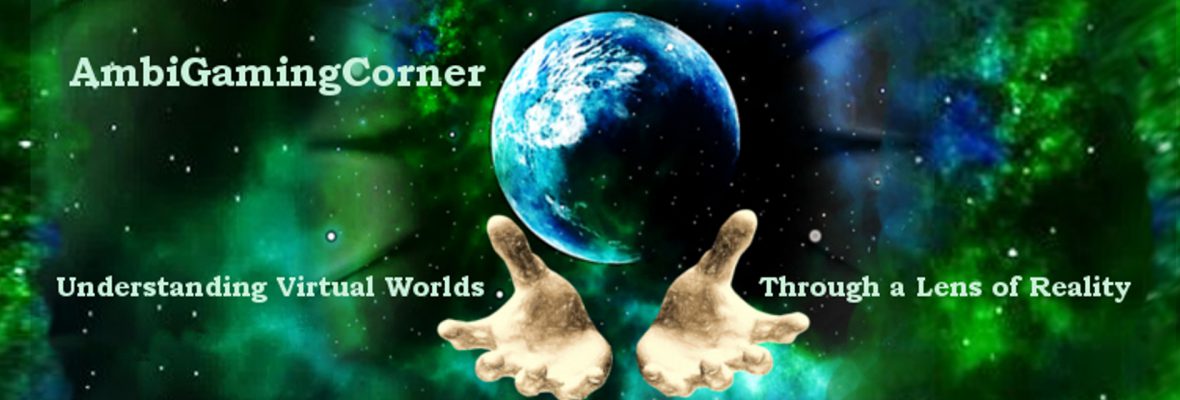I love a good story, I love when media tackle hard topics, and I love when a game uses mechanics to tell its story. For your consideration, I present Gris, the platformer-adventure game developed by the Spanish developer Nomada Studios. It was released in either 2018 or 2019, depending on platform, and won a Games for Impact Award at the 2019 Game Awards.
For those of you who’ve been around a while, you know that I loved Journey and how it handled the hero’s journey through its story and mechanics, and thought it was an immensely personal and profound experience. I had similar praise for RiME, which paid homage to Journey while having its own identity and emotional story. I had mixed feelings about ABZU, and was overall underwhelmed by the story, and so when I heard in passing that “people who like Journey will like Gris,” I was a little wary to jump in. But I purchased it and settled in with a twinge of apprehension.

I had nothing to worry about. Gris is a visually unique and beautiful game that brings the player on a journey of discovery, both for themselves and for the character. Like Journey, it is impossible for the character to perish, but that doesn’t stop parts of the game from being heart-pounding urgent. There were times that my heart was pounding, but of course, your mileage may vary.
Unmarked spoilers for the game below. I suggest you play Gris for yourself before proceeding, but just know that major plot spoilers, examinations of symbolism, and other theorizing takes place below the icon.

The game starts with the main character, presumably the titular Gris, singing to a very motherly-looking statue. But then, something goes wrong. The statue crumbles, and Gris tumbles down, down, down, into a land devoid of color. Devoid of everything, except one black line on which she can walk. Gris has even lost her voice.
When I talked about Journey, I posed that the Traveler progressed through The Hero’s Journey, an archetypical series of events that, presumably, every hero in every story goes through, simply by exploring the world. For the stage dedicated to denying the call, Journey captures this when the Traveler tries to walk “out of bounds” and is pushed back into the playable area. With the other stages so beautifully outlines, it was refreshing to see the game mechanically reinforce this journey (roll credits).
Similarly, Gris takes us on a journey that is enhanced by the game mechanics, but instead of the Hero’s Journey, we take a stroll through the stages of grief. And, where RiME used imagery to convey each stage, Gris gives the player the opportunity to act it out within the game.

For instance, the first stage of grief is denial. In the game, we are presented with said straight line Gris facing the right, just like every other 2D platform game in the history of 2D platform games. To achieve the “denial” trophy, one must walk to the right until Gris collapses, and then leave her to stand up on her own. At that point, the player should have Gris turn to the left and walk left for a few frames, until she can’t proceed further and collapses again.
Denial.

Another stage, depression, has Gris diving down into deep, dark waters where there are no lights, finding a hidden tunnel, and following the darkness until she finds a statue in the act of falling.
It was fantastically done.
True, some of these are not very intuitive “trophies” to find, but I found it fascinating trying to figure out what, mechanically, showed the stage of grief Gris was passing through. So even if you read no more of this article, I would highly suggest playing through Gris if you have a chance.
Heart of the Matter
At its core, Gris is a game about the fear we live with, and how we defeat it. And it give us the opportunity of practicing – at a safe distance – the stages of grief we all go through throughout our lives. After all, the stages of grieving don’t only occur after a death. For any big change, we can go through the stages of grief as we readjust to our new normal and transition from our “old” life to our “new” life.

Through Gris’s actions, we help guide her through her grief and toward acceptance. But, more interestingly, we use the “abilities” that she learns at each stage to progress. She can transform into a rock after the anger stage, and learn to double jump during bargaining (as if trying to pull herself out of the grief cycle with an extra boost), and swim to the darkest depths during the depression stage, and even face down utter despair (in the form of an eel) while keeping it from destroying us, only to eventually find her voice again at the end.
Our Shared Grief
2020 was a difficult year for all, and a downright horrific one for others. 2021 came with new hope, only for the hoped-for light at the end of the tunnel be a small flashlight guiding us alone the path, rather than the rising sun some people believed it would be. We all faced grief and dealt with it in our own ways. It’s no wonder the mental health of so many took a hit. Endless stress and endless grief will do that to a person.
A few months ago, I mentioned to Kim from Later Levels that she had given me an idea about gaming and institutionalization during COVID-19. She had mentioned that it would be a real adjustment to go back to work, after so many people had begun streaming during the pandemic and we had all been able to spend so much more time together. I puzzled through this, because at first glance this made me think of institutionalization, like I said, which is when a person becomes so used to living in an institutional setting they are no longer able to live “on the outside,” or are afraid to.
But as I thought about this, I realized that it was possible that we, collectively, had gone through the grieving process for our “before” lives, and shied away from the thought of having to do so again. Sure, there were things that were better before the pandemic, but there are things that are better now, too. In both cases, we would need to give up those good things and transition, again, into a new life.
A Post-COVID-19 World
My last day at the office was March 16, 2020. I saw two clients that day; all the others cancelled as we heard reports of COVID-19 cases beginning to rise in my area. When my coworker and I got the call from our boss, it was essentially, “When you leave today, take whatever you need to work from home, because you’re not coming back.”
To my boss’s credit, we were up and running on telehealth three days later. However, this was also very difficult, because it was such a huge change and, like so many others, we didn’t have a chance to really process what was going on. We left work in fear and uncertainty, had three days filled with frantic phone calls and flurries of emails, and then began to proceed as “business as usual.” Except it was anything but usual.

Some people lost their jobs. Some people lost their homes. Some people lost their lives. Some people lost loved ones. We all lost our familiar ways of life. We all sat in fear, wondering what we might lose next. Like Gris, we all lost our voices, in one way or another. We all needed to grieve the life we had before, in whatever way that meant. In the most basic form, the life we were grieving was a life free from fear of serious illness, which is a big thing to let go of.
And yet we did. We tightened our belts, cleaned our closets, found new routines, and eventually settled into a new routine. And, as we have talked about before our brains like routine and predictability, and, although it’s taken a year, we’ve settled into a new normal. We found our voices again, after raging at the government and our bosses, after feeling hopeless and terrified, after wishing for things to be different, we (at least some of us) arrived at an acceptance of our new fate.
And so we found our voices again. We found a way to live in a post-COVID-19 world.

Now, as we look ahead to transitioning back to our “old” normal, but with a “new” spin on it, we find ourselves in a familiar situation: facing the unknown, and upheaving the New Normal that has become comfortable and familiar. So, as we prepare ourselves for another transition, I wonder if we’ll see the stages of grieving we go through again. I think that being aware of these transitional phases would help ease the procedure.
Either way, we have no other choice but to continue on, little by little putting pieces back together, and little by little finding our voices, as many times as it takes, until we find that place of acceptance and peace again.
Have you played Gris? What did you think about it? Have you noticed a change in your feelings toward quarantine from the start until now? Let’s chat in the comments!
Thanks for stopping by, and I’ll see you soon!
~Athena
Do you like what you’ve read? Become a revered Aegis of AmbiGaming and show your support for small creators and for video games as a serious, viable, and relevant medium!


Oddly enough, I played Gris in December 2019, right as we started hearing more stories of this new virus. I loved the game and its ability to be “simple, yet powerful” in a way similar to a lot of great indie releases.
My job transitioned to work from home at the beginning of 2019, so I had a year to adjust to “quarantine living” as I wasn’t typically one to do all that much outside before the pandemic, save for getting groceries, going for walks, or the occasional game store visit. I realize that all this made a lot of things easier for me than so many others, but one of the differences in “before and after 2020” would probably be due to the fact so many within the WordPress community were able to connect with others through social media like Twitch or Discord and keep each other company while everything was happening.
LikeLiked by 1 person
It’s a wonderful game! I glad you had a chance to play it 🙂 Simply yet powerful is a great description for it.
That’s good you had a chance to get into the groove regarding working from home and things like that – makes the job anxiety during a pandemic a lot less, for sure. I agree that one of the nicest things about the pandemic has been all of us being able to hang out so much more, and we were able to “game” together in one way or another!
LikeLiked by 1 person
I love your post-COVID take of this. I went back to look at when I played and wrote about it — it was January 8th last year, so a bit before things really kicked off in earnest.
It’s amazing and fantastic, I think, how well this game can be framed by so many different contexts.
For anyone else reading along: Potential Spoiler warning. Probably goes without saying in the comments for this post, but there it is just in case. 😉
Right.
I started out playing the game with what I believe is the author’s intention — to view Gris’ journey as one against the loss of her mother.
But as I got further through the game, I forget exactly where and my post doesn’t say, I started to wonder if it wasn’t Gris herself that was passing. That perhaps the Kubler-Ross model was being used for it’s original intent here — for the purpose of terminal patients to come to terms with their prognosis.
You start the game rather earth-bound, railing against what is to come. You end up — after being chased by the oily sludge through a series of ever splitting, and narrowing pathways, perhaps an analogue for arteries into smaller blood vessels — taking a walk in a literal celestial heaven. You ascend a stairway of stairs before the final cutscene plays outs.
Normally, I’m all about knowing the author’s intent. Not knowing can drive me absolutely batty. But this, I think, was one of those rare cases where I wish it had been left a little more open.
Game aside — hope you’re doing well Athena! In terms of quarantine, been somewhat lucky here in NZ. Although I am in Auckland where we’ve had a couple of additional lockdowns post the first longer ones, we really have nothing to complain about as compared to much of the world.
Border restrictions notwithstanding, things are more or less back to BAU here, which I greatly appreciate. Well- except for the traffic. I could happily give that back. 😉
LikeLiked by 1 person
Thank you! It’s something I’ve been thinking about for a while. I agree that it’s really wonderful to see how versatile the story in the game can be. But then, the stages of grief can be applied to many different situations, too!
Spoilers below for those reading.
I agree with you about the idea of the story being about Gris’s passing (especially because, like you said, we start on the earth and wind up with the stars), and not her mother’s, although it also occurred to me that maybe Gris was also mourning the passing of her own childhood. She had been safe and sound in her mother’s hand, and then that protection was suddenly gone – a very powerful metaphor for growing up, too! I love that the story is very open to interpretation.
I’m doing well, and I’m glad to hear you are doing the same! We are starting to open up again, now that vaccines are more readily available, and so things are tentatively get back to “normal.” Likewise, I was very lucky with where I was, the response at my local and state government level, and with my and my family’s overall health and caution, so I really can’t complain about the very few bumps we came out of the pandemic with!
OMG the traffic. I had hoped with my whole heart that more people would continue working from home, but alas! haha
LikeLiked by 1 person